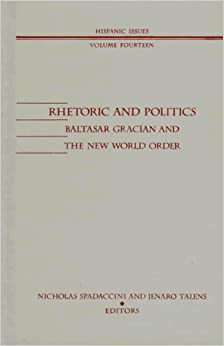Background
Jenaro Taléns was born on January 14, 1946, in Tarifa, Spain.

Av. Séneca, 2, 28040 Madrid, Spain
Jenaro attended the University of Madrid, Spain, where he got a Bachelor of Arts in 1968.
Hospital Real, Avenida del Hospicio, S/N C.P. 18010 CP:18071 Granada Granada S/N C.P. 18010, 18010 Granada, Spain
Taléns studied at the University of Granada, Spain, where he began focusing on philology, or the study of language.
Photo of Jenaro Taléns
Photo of Jenaro Taléns
Photo of Jenaro Taléns
Photo of Jenaro Taléns








(Considers current events through an examination of this s...)
Considers current events through an examination of this seventeenth-century philosopher. In recent years there has been a revival of interest in the writings of Baltasar Gracian, a seventeenth-century Spanish Jesuit who explored the political uses of rhetoric. Gracian is best known in the United States for his bestselling collection of aphorisms entitled The Art of Worldly Wisdom. The essays in this volume focus on the relevance of Gracian's writings in our own day when the importance of rhetoric as a discipline necessary to manage public life is indisputable. Wide-ranging in focus, these essays demonstrate that Gracian's work offers insights into the deployment of rhetoric under the "New World Order."
https://www.amazon.com/Rhetoric-Politics-Baltasar-Institute-Adminstrative/dp/0816629102/ref=sr_1_4?dchild=1&keywords=Jenaro+Tal%C3%A9ns&qid=1601369236&rnid=2941120011&s=books&sr=1-4
1997
educator essayist translator poet
Jenaro Taléns was born on January 14, 1946, in Tarifa, Spain.
Jenaro attended the University of Madrid, Spain, where he got a Bachelor of Arts in 1968. He was drawn to architecture and economic science, but when he continuing his education at the University of Granada, Spain, he began focusing on philology, or the study of language. In 1971, he was awarded his Doctor of Philosophy in Romance languages. He wrote his thesis on the early-twentieth-century Spanish poet Luis Cernuda.
Jenaro Taléns began teaching Spanish literature, literary theory, and communications at the University of Valencia and at University Carlos III of Madrid. Between 1983 and 2000 he split his time between Spain and the United States, where he had secured a position as a visiting professor at the University of Minnesota. While at Minnesota, he and a number of colleagues, including Nicholas Spadaccini, collaborated on a series of books, which were published by the University of Minnesota Press. Though they all centered on Spanish studies, they ranged in subject matter from an examination of Spanish films ("Modes of Representation in Spanish Cinema") to investigations of the seventeenth-century Spanish priest, writer, and moral philosopher Baltasar Gracián ("Rhetoric and Politics: Baltasar Gracián and the New World Order").
Having gained an international reputation from his publications, Taléns has been invited to teach at the university level throughout Europe and the Americas.
He has had professorships in countries that include Canada, Germany, Argentina, Denmark, and Italy. In addition to his position at the University of Minnesota, Taléns taught at the University of California at Irvine. Most recently he was appointed Professor of Hispanic Literature, Comparative Literature, and European Studies at the University of Geneva, a position he holds along with a professorship of literary theory and film at the University of Valencia.
Jenaro Taléns is also an accomplished poet and has published numerous volumes of poetry. His first book of poetry, "En el Umbral del Hombre," appeared in 1964 before he even graduated from university. Among his various volumes of poetry are his two anthologies, "Cenizas de Sentido: Poesía" (1962-1975) and "El Largo Aprendizaje: Poesía" (1975-1991). In 1994 he was awarded the Premio de la Critica de la Comunidad Valenciana for his volume Orfeo Filmada en el Campo de Batalla.
As a translator himself, Taléns has tackled the classics of Western literature, including William Shakespeare's "Hamlet," "The Tempest," and "Twelfth Night, or What You Will." Other translations include plays by Samuel Beckett, and poetry by Ezra Pound, Wallace Stevens, Derek Walcott, and Seamus Heaney. In addition, he has translated into Spanish works from the German (Johann Wolfgang von Goethe, Novalis, Friedrich Hölderlin, Georg Trakl, Hermann Hesse, Bertolt Brecht, Rainer Maria Rilke), French (Edmond Jabès, Yves Bonnefoy), Italian (Alda Merini and Nuno Judice), Portuguese (Fiama Hasse Pais Brandão), and Chinese (Lu Hsün).
As the editor of "Autobiography in Early Modern Spain," Taléns offered an examination of texts largely from the sixteenth and seventeenth centuries and included transcription and translation of the "curriculum vitae" of Cervantes.
Taléns founded and is a coeditor of the "Eutopías" series for the Spanish publisher Hiperión, which includes books on critical thought with an unusual mandate. "Eutopías" was devised to fill the enormous political and intellectual void existing by 2000. The aim of the series is to make a significant difference in the field of contemporary knowledge by encouraging a "rebirth of critical thought" free of dogmatism and the seeming indifference of much academic writing.
Taléns applies his background as a historian and theoretician to his understanding not only of literature but also to genres of popular culture, such as film and music. He has written numerous books and papers on Spanish film and film in general and co-authored the monumental "General History of Film," a twelve-volume endeavor. In "Modes of Representation in Spanish Cinema," Talens and Zunzunegui offer an examination of the period between 1930 and 1970 when Spanish filmmakers developed a signature style that transcended the repressive Franco years. Taléns has also written widely on the Spanish filmmaker and cinematic Surrealist Luis Buñuel. In "Music in the Digital Age and Rock Cultures," he examines the sociological aspects of contemporary music.
Jenaro Taléns is an outstanding and prolific author of more than thirty scientific books (in Spanish, French, and English) and about twenty books of poetry, collected in three volumes.
He has won the Loewe International Poetry Prize (1997), the Villa de Madrid Poetry Prize (2002), twice the Valencian Community Critics Prize (1981 and 1994) and the Andalusian Critics Prize (2003). His poetry has been translated into French, English, German, Portuguese, Italian, Bulgarian, Lithuanian, and Hebrew.
(Considers current events through an examination of this s...)
1997
